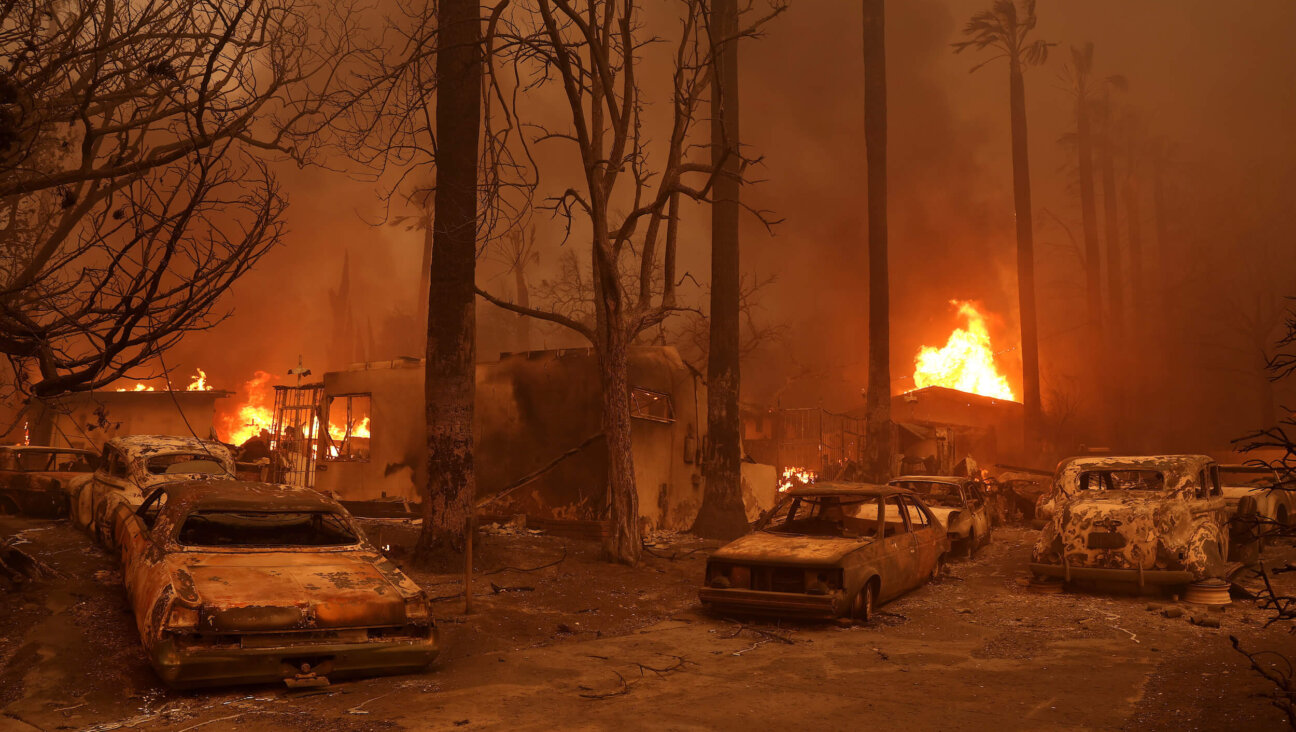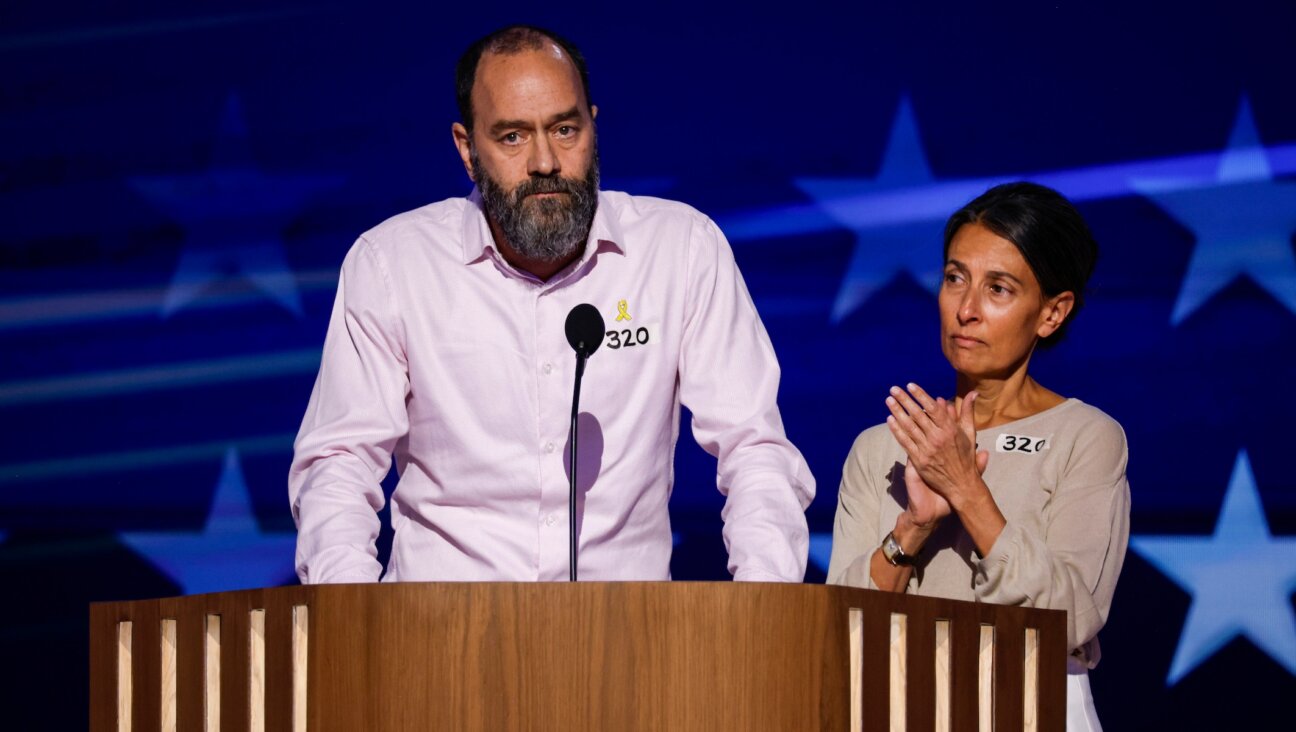Gaza War a Real-Life Reality Show for Israelis Near Border

Image by getty images
(Reuters) — Sitting on a leather sofa in flip-flops and shorts, smoking and eating snacks, a group of middle-aged Israeli men look like they are watching a soccer match on TV, but they are perched atop a hill overlooking the Gaza Strip watching a very different kind of contest.
The buzz of drones flying overhead is interrupted by the blast of rockets fired from the Palestinian enclave. Surrounded by camera crews who rush to catch the action, the men watch for the distant explosions of Israeli air strikes, occasionally offering their commentary on the fighting.
“I don’t come up here to cheer at their troubles,” Yochanan Cohen, 57, said of his neighbors in Gaza. “I’m sick of sitting at home all day. Everything is closed. People are scared, many have left and those who’ve stayed won’t go out.”
Cohen lives in Sderot, a town near Gaza frequently targeted by Palestinian militants’ rocket salvoes. His house was struck by a projectile just a week ago, he said.
“I’m sure the simple folk in Gaza just want peace and quiet, like we do. I don’t want to see houses destroyed here and I don’t want to see houses destroyed there,” he said.
“But Israel needs to go in there once and for all and get rid of the terrorists and all their weapons.”
Health Ministry officials in Gaza say at least 188 Palestinians, most of them civilians, have been killed in the fighting, the worst Israel-Palestinian flare-up in two years, and 259 houses have been reduced to rubble by Israeli attacks.
Down the road from Sderot, a row of Israeli tanks stand idle by a watermelon patch. Israel has sent extra troops and called up more than 30,000 reservists in preparation for a possible ground operation in Gaza, where its offensive launched on July 8 has been mostly aerial.
A truce proposed by Egypt and adopted by Israel early on Tuesday collapsed shortly afterwards as Gaza militants kept up rocket salvoes and Israel responded with air and navy strikes.
LIMITED PROTECTION
Israel’s Iron Dome missile interception system has shot down most rockets aimed at populated areas minimizing casualties.
But not all projectiles are shot down. Israel suffered its first fatality when a mortar killed a civilian not far from the Gaza border. More than half a dozen other Israelis have also been wounded in rocket attacks.
One rocket landed by an apartment building on Monday, lightly wounding an 8-year-old boy, in the southern Israeli port city of Ashdod.
Surrounded by broken furniture and shattered glass that had scattered across the living room of the damaged flat, the boy’s great-grandmother swept up the debris.
“How much longer can this situation go on?” said Naftali Danielov, a relative of the injured boy.
The Israeli military says Gaza militants have fired more than 1,150 rockets into Israel in the past week.
Like many Israelis living in southern towns repeatedly hit by Palestinian rockets for over a decade, Danielov wants to see tougher military action against militants firing the weapons.
“We are not afraid. We are willing to sit here and take it as long as it takes for them (Israel) to end it, not in a year or two or ten. Enough already. Either we live in peace or I’m ready to go to war,” Danielov said.
Violence has flared several times in the past few years across the Gaza border, forming a pattern in which an Egyptian-mediated truce takes some days to take hold, followed by months of relative calm, eventually broken by another flare-up.
One of the Sderot residents who had spent the night on the hilltop sofa seemed skeptical that the overnight lull he had just witnessed would last for long.
“Okay, it’s over,” he said as he headed home. “See you again next year.”
A message from our Publisher & CEO Rachel Fishman Feddersen

I hope you appreciated this article. Before you go, I’d like to ask you to please support the Forward’s award-winning, nonprofit journalism so that we can be prepared for whatever news 2025 brings.
At a time when other newsrooms are closing or cutting back, the Forward has removed its paywall and invested additional resources to report on the ground from Israel and around the U.S. on the impact of the war, rising antisemitism and polarized discourse.
Readers like you make it all possible. Support our work by becoming a Forward Member and connect with our journalism and your community.
— Rachel Fishman Feddersen, Publisher and CEO























